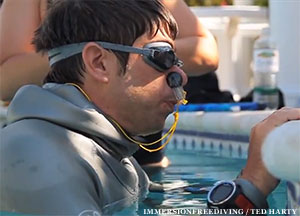Remember being a kid in the pool, trying to outdo your friends by holding your breath underwater? The first few seconds were easy. Things got a little uncomfortable at six or seven seconds. But around 15, your lungs began to sting with a desperation and your mind began to scramble. Finally you felt the need to just give up and explode to the surface to devour as much air as your body would hold.
That desperate lack of oxygen has become the air Ted Harty breathes.
When the 37-year-old freediver was just a kid in Atlanta, he found comfort at the bottom of a swimming pool the way other kids do on a bike or with a baseball bat. He learned to scuba dive and eventually his longtime love of water, coupled with an athlete's competitive streak, led him to the challenging sport of freediving.
A few days ago, he made history at it, somehow putting aside both his fear and human instinct to set the U.S. national record for Dynamic Apnea freediving. Harty swam 170 meters in a pool on a single breath. That's more than a tenth of a mile.
Watch Harty setting the mark at the AIDA Individual Indoor Freediving World Championships in Italy, spending nearly three full minutes underwater:
It almost seems like an optical illusion -- some sort of Houdini act. And then you see Harty emerge and take in all the sweet air he can.
Not bad for a one-time smoker.
So here's what actually happens underwater during the three styles of freediving: In Dynamic Apnea, which Harty did, the diver swims with fins or a monofin in a pool, holding his breath while swimming as far as he can. Dynamic No Fins is performed when the diver swims without the aid of fins or a monofin, but still holds his breath while swimming as far as he can doing a modified breast stroke. Static Apnea is a test of pure breath hold for time. The athlete holds his breath with his face in the water while floating on the surface of the pool.
Having kicked the college Marlboro Reds habit -- he has a psychology degree from Vanderbilt and a computer science degree from Georgia Tech -- Harty spent a year working as (surprise!) a professional magician in Atlanta before moving to Florida and taking up a life aquatic. He started scuba diving in 2005 and did his first freedive in 2008.
"It's very addictive," Harty says. "In 2008, I was a out of shape overweight scuba instructor that could barely run a mile. Now I'm a U.S. national record holder!"
Harty now spends the majority of his time teaching in Ft. Lauderdale through his company, Immersion Freediving.
Teaching freediving full-time gives him an advantage, in that he spends plenty of time underwater. But part of his training is done on dry land, following breathing exercise programs he can do from the comfort of his couch.
Three years ago, he struggled to hold his breath for more than a minute. Now he can go six.
Freedivers, especially those who train and compete in pools where you can come up for air almost immediately, talk of the "evil monkeys" in your brain that tell you to give up.

"You can quit whenever you want in the pool, as soon as your brain says, 'This sucks, I want to breathe,'" Harty says. "In the ocean there is no quitting. The pool requires a different mentality. You have to override a strong desire to quit."
Harty has no intention of quitting, even with a U.S. record behind him. He plans to keep fighting the evil monkeys, and teaching his bold, amphibious students how to do the same.
"I felt a great feeling of validation, that all my training worked," says Harty of his record-breaking swim. "It was an amazing confidence builder.
"I mostly look at my self as a teacher not and athlete, but I thought 'Hey now I can say I'm a good athlete as well.'"
He's both a teacher and an athlete. And anyone who says otherwise is simply wasting his breath.
Related Stories:
-- The Al Davis Fashion Statement
-- Tweets By LeBron James, C.J. Wilson And Alex Morgan
-- NBA Announcer Chris Carrino: My Battle Against FSHD Muscular Dystrophy






